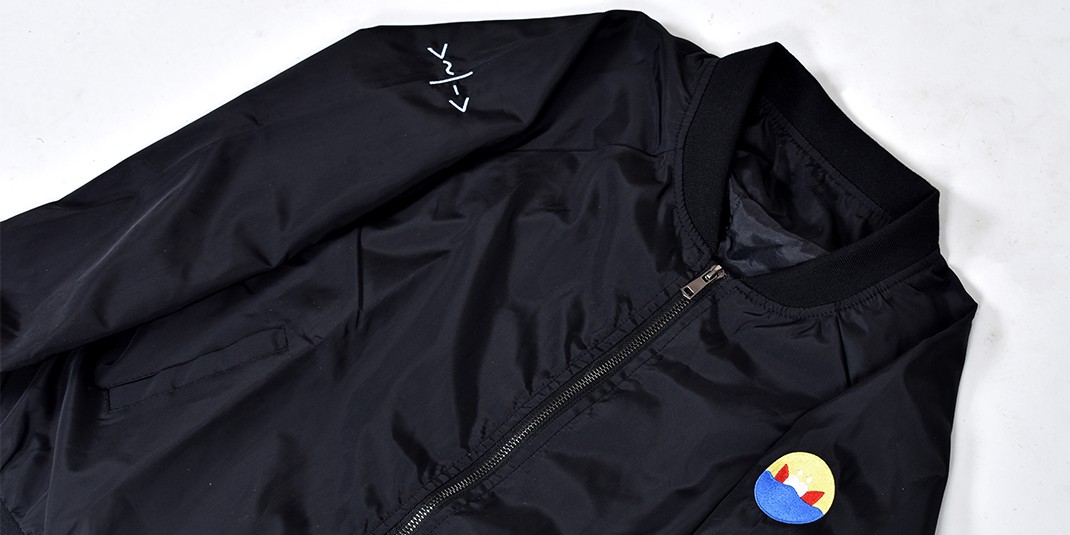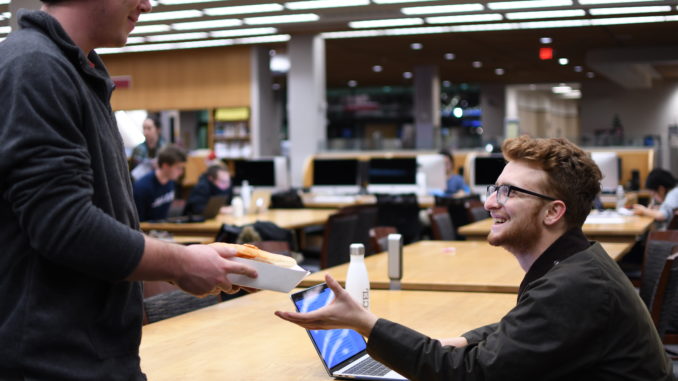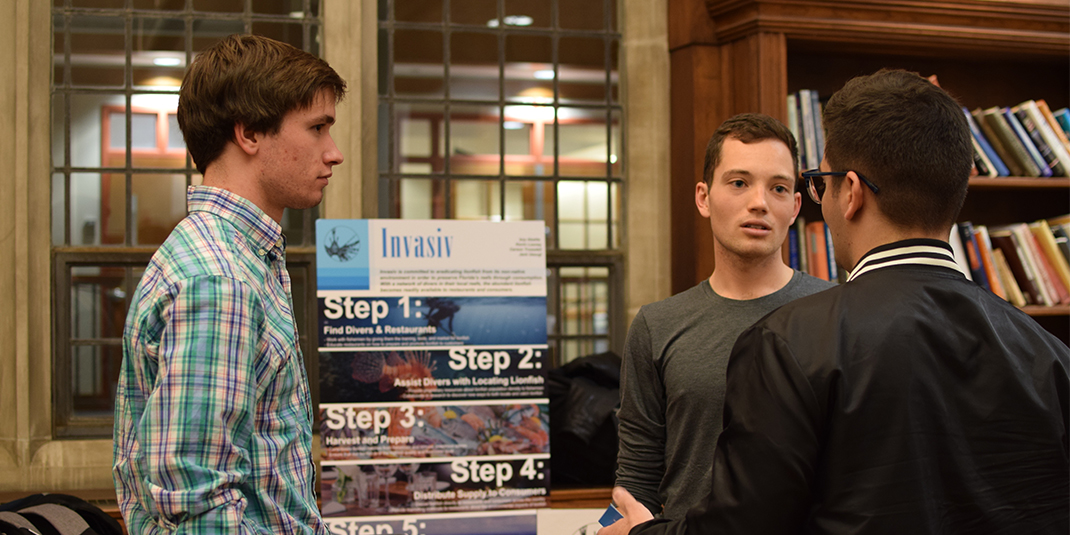A jacket that saves whales’ lives. A doll custom-made to any body shape, skin color, or even language. And a way to get your favorite dining-hall panini without venturing from your dorm room.
These are just a few of the dozen products and services—some only on paper, some already on offer—that Boston College student entrepreneurs pitched at this semester’s Accelerate@Shea Demo Day. Hosted by the Edmund H. Shea Jr. Center for Entrepreneurship, about 50 students gathered in the Fulton Honors Library late last month to hear their peers present ideas that might change the way restaurants attract new customers, bands gain fans, and students plan trips.

The cetacea-saving jacket comes courtesy of Jenness, a joint venture of Will Dailey, Carroll School ’20, and Nick Bomleny, Morrissey ’20. Every year, thousands of whales as well as dolphins, porpoises, and seals are caught in abandoned fishing nets, also called “ghost nets,” though the nylon and plastic meshes are all too real and impassably solid. Like humans, sea mammals need oxygen to breathe, and if they can’t disentangle themselves from a net in time to surface, they drown.
The health of the ocean and its ecosystem is a prime concern for the Jenness partners—both are longtime surfers. Dailey, who studies information systems and entrepreneurship, grew up in the San Francisco Bay Area, and math major Bomleny is from Winter Garden, Florida.
Jenness is working with an Italian company, called Aquafil, that harvests ghost nets and recycles them to make a yarn they call Econyl. That’s the material Jenness will use to make their first product, a woman’s bomber jacket. “It looks as good on the beach as it does on a night out,” said Dailey, who displayed a prototype at Demo Day. “And it’s made sustainably.”
Another socially conscious product is the brainchild of Suhee Vesper Yun, Morrissey ’18. When it comes to diversity, Yun said, the doll industry can do better. Her startup, Dream Dolls, would offer custom-designed dolls reflecting any ethnicity, skin color, body shape, or disability—encompassing up to 8,000 variations, she said. In the future, Yun hopes to produce talking dolls that would speak in any of a variety of languages.
Yun has made samples of her dolls, and she has already registered her business in the U.S., Japan, and South Korea.

JB Bruggeman, Carroll School ’19, launched his business on campus this semester, in partnership with Boston College Dining Services. With the BC GET app, students can skip the long lines and order meals from Boston College dining halls. The key is that the food is delivered—to your dorm, the library, or any other location on the Heights—by fellow Boston College students. “They know how to navigate the campus,” Bruggeman said, drawing a contrast with a typical pizza deliverer. “They know the difference between Bapst Library and Burns Library,” and they have easy access to the residence halls, being residents themselves. “So while our competitors [from off campus] are still in the lobby looking confused, your food is already here with BC GET.”
In its first two weeks in business, BC GET made 200 deliveries, said Bruggeman, a business analytics and marketing student originally from Palo Alto, California. “And for students looking for jobs,” he said, “we offer good wages and flexible hours.”
All the entrepreneurs at Demo Day forged and honed their concepts through the six-week Accelerate@Shea program, which gives students space, expert advice, and funding to help them launch and grow a business. The event in the Honors Library was a chance for them to practice pitching and then, as students mingled and perused the startups’ table displays, to network and get honest feedback about their products.
Though they came from a range of backgrounds and their ideas addressed different problems in different niches—from insurance to nonprofits to social networks—the entrepreneurs all had some qualities in common, said Shea Center Executive Director Jere Doyle in his keynote speech at the event’s start. “An entrepreneur creates something out of nothing,” said Doyle, who is also an angel investor, a venture capitalist, and a part-time faculty member at the Carroll School.
“An entrepreneur is creative, innovative, persistent, and passionate,” Doyle continued. “And they make things happen, they just go for it.” Some of the evening’s products will catch on, and some of the startups won’t last the semester, he said, “and that’s OK. We fail all the time as entrepreneurs. It’s testing things out and creating new things. If it doesn’t work, shelve it, and move on.”
Patrick L. Kennedy, Morrissey College ’99, is a writer in Boston and the co-author of Bricklayer Bill: The Untold Story of the Workingman’s Boston Marathon.



